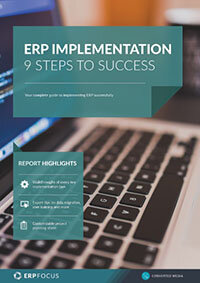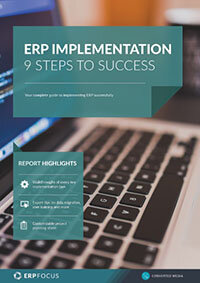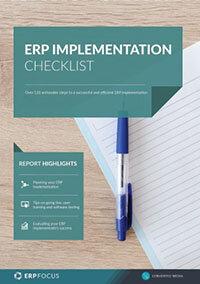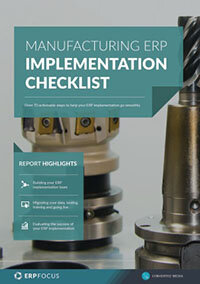4 pieces of advice I wish I heard before my first ERP project
As the old saying goes, ‘hindsight is 20/20.’ However, whether one is simply unwilling to accept reality driven by long experience, or just numb to common sense, the world of ERP continues to turn even though there is always someone willing to suggest that they ‘didn’t get the memo.’ Consequently, we thought it might be useful to point out some ERP implementation advice that many project managers may wish they had heard a long time ago.
I wish I had known how little previous software projects would prepare me...
To quote U.S. Civil War historian Shelby Foote, understanding the impacts of some technologies are ‘...like trying to swallow a cannonball.’ This is particularly true in the case of ERP since the technology is driven by dynamic data that touches a company at the macro level, then proceeds to drill into the very bowels of a company’s processes.
Recommended reading: ERP implementation - 11 steps to success
The practical truth here is that the implementation of ERP is not the same as the implementation of any ‘typical’ enterprise application, where one can execute a two hour software upload followed by nearly instant results. Instead, expectations should be measured on the basis of months, and in some case years, before useful results appear on the bottom line.
I wish I had known how much an ERP implementation would cost...
“Time is money,’ as Benjamin Franklin opined. However, while Ben was pointing out that ‘wasting time’ is never a good thing, in our ERP case, the point is more applicable to the number of expected hours in consulting and third-party support necessary to get a complex ERP system to run efficiently.
While most of today’s systems may look good on paper in the CFO’s office, they don’t usually work operationally unless managers, consultants and hosts of ‘knowledge-engineers’ make a system do what it is supposed to over time.
A typical mistake in this case, is driven by budgetary mismatches between what system engineering actually costs, once is all said and done, versus what most cost accountants prefer to dream up. Unfortunately, a good rule of thumb for costs is to factor the accountant’s baseline times five to get closer to the truth; but even then, one might want to add even more chocolate to the mix before you start baking brownies.
I wish I had known how long it would take to gain usable information from my company’s data...
According to Webster’s, “The term data refers to factual information, especially record elements used for analysis, and based on reasoning or calculation. Data itself offers no meaning, and only becomes information when it is fully interpreted.”
Unfortunately, many ERP users fail to understand the differences between data and information
Therefore, in the case of defining the length of time required to gain information from an ERP platform, any useful formula will encompass some form of ‘record density times effort’ formula, or more simply put; the more data elements involved, the longer it will take to produce ‘reasonable’ information. Unfortunately, many ERP users fail to understand the differences between data and information, believing instead that the more data elements acquired by the company the more useful knowledge will accrue, but to be colloquially blunt, ‘it just ain’t so.’
I wish I had known how complex my ERP system would be...
Any ERP platform represents a complex mechanism made of clusters of static and active data elements driven, pushed and pulled by the intellectually subjective whims of today’s business processes. These three primary actors are further agitated by what many refer to as The Internet of Things (IoT), which has the potential to add hosts of affiliate data points to our already complex systems. If left unchecked, these additional data sources have the potential to exacerbate today’s operational white noise.
Altogether, this constellation of fundamentals can create hosts of wheels inside wheels of complexity that may well cause an ERP project manager to cry “Merde’, while spontaneously pulling out their hair. However, rather than getting wrapped around the axle over what you cannot control, or just how complex you particular ERP platform is, just stick to the basics and pay attention to these pearls of ERP implementation advice I wish I had heard a long time ago.
Free white paper

ERP Implementation: 9 steps to success
The 9 proven steps you should follow when implementing ERP

Featured white papers
-

ERP Implementation: 9 steps to success
The 9 proven steps you should follow when implementing ERP
Download -

ERP Implementation Checklist
Over 120 actionable steps to implementing a new ERP successfully
Download -

Manufacturing ERP Implementation Checklist
Over 70 actionable steps to rolling out new manufacturing ERP software
Download
Related articles
-

The case for multi-tier ERP implementations
Learn more about multi-tier ERP implementation and why you might need one
-

CMMC Compliance: What Aerospace and Defense Manufacturers Need to Know
Key insights on CMMC compliance, deadlines, and securing DoD contracts with CMMC 2.0 certificatio...
-

An example ERP implementation team structure for your project
Learn about three key elements of an ERP implementation team and the individuals who contribute w...

